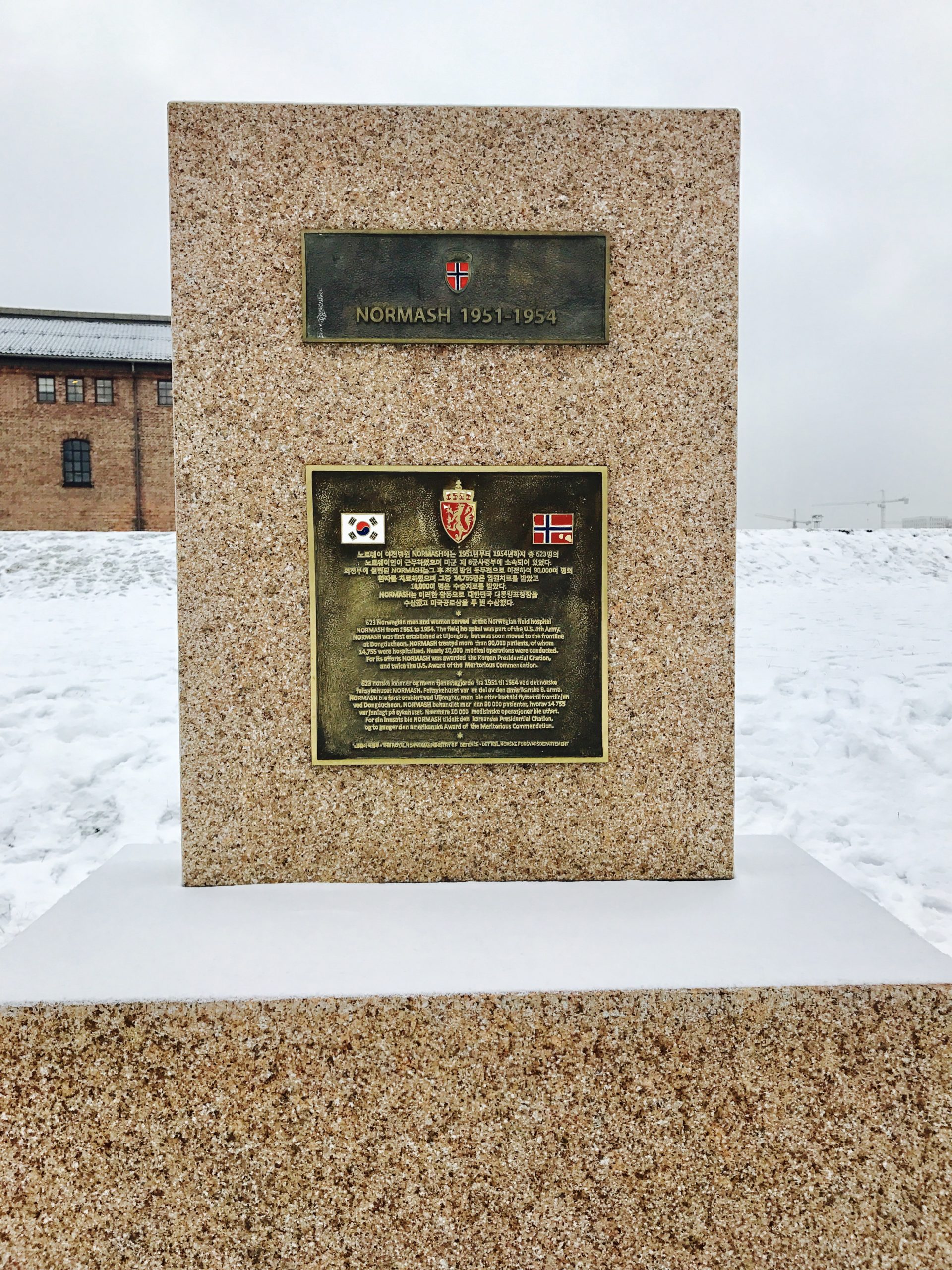노르웨이 오슬로 (3)
>> You have from there, the German, Norwegian soldiers in Germany after war.
>> Okay.
>> And we have those from Sweden, if you see, to Sweden, the Korean, Norwegian Korean there in the middle.
>> Okay.
>> [INAUDIBLE].
>> Do you read Korean?
>> Yes.
>> Yes.
>> NORMASH, 1951 to 1954, wow, 623 Norwegian ... More than 90 patients.
>> Ninety thousand, 90,000.
>> Ninety thousand, I mean, 90,000. Were any Norwegian servicemen or women killed?
>> Three of them.
>> Not in battle, not in battle.
>> Three?
>> But not in battle but in service.
>> Accidents.
>> Accidents?
>> Yeah.
>> What kind of accidents?
>> Driving accidents.
>> Driving ...
>> In Korea?
>> Yeah, yeah, during the service, yeah.
>> Oh, no.
>> And the third one is a Norwegian sailor.
>> Sailor, yes.
>> Because when the Korean War started, a lot of Norwegian ships were in the area, so they worked with evacuation of civilians from the war zone and also the transportation of heavy military material from the fan to Korea and back to Japan for repair also.
>> So ...
>> But it's not so well-known.
>> I only thought ...
>> We have written about it in our book.
>> I only thought doctors and nurses went from Norway.
>> Oh, no, personnel too. To run a MASH, you need more than doctors.
>> One hundred persons in total.
>> One hundred and six.
>> Sixty of them working in the hospital.
>> Each continent, 106 persons.
>> And the very necessary addition ...
>> Cooks, cooks, guards.
>> Drivers.
>> Drivers.
>> Technical personnel.
>> Technical and camp workers.
>> But ...
>> And in addition, 60 Korean too.
>> Yes.
>> Really? So ...
>> About 25 Korean guards?
>> Yeah, approximately.
>> Approximately.
>> And four were working in the camp.
>> And civilians too.
>> So 100 medical personnel?
>> Yeah, yeah, and the MASH consists of 100 persons, Norwegian persons.
>> And 523 other servicemen from Norway because there were 623 total.
>> Yes, in total.
>> No.
>> All Norwegian were volunteers.
>> Each continent ...
>> Yeah, continent, yeah.
>> ... for 1/2 a year, and we had six continents.
>> Seven, seven.
>> Seven at all, and they changed every 6 months, and each continent had 106 persons, personnel, and of those, approximately 40 medicals.
>> No, 60 medicals.
>> So many?
>> Yeah [INAUDIBLE].
>> [INAUDIBLE].
>> It doesn't matter, doesn't matter.
>> And of course, the medicals, the hospital is the main thing of a MASH, of course. MASH stands for Mobile Army Surgical Hospital, MASH.
>> There's a very famous TV series in America.
>> We have seen that.
>> Comics.
>> What do you think of that?
>> The scenery is very natural. I don't know where it's taken, but it looks like Korean scenery.
>> Yeah.
>> And the tents and everything is very, very close to ...
>> Real?
>> ... real, yeah.
>> And you see here, NOR, that stands for Norway, MASH.
>> And if you behaved well, you could have a new contract for 6 months. I behaved very well, so I stayed for 1 year.
>> One year, but why ...
>> He didn't behave so well, and so he stayed for another 6 months.
>> You all volunteered.
>> Yes, we all were.
>> Everybody was volunteer.
>> Wasn't it difficult? Why did you want to stay longer? Wasn't it difficult?
>> To stay longer? No, no, I had service after the war or armistice.
>> Approximately 100 stayed more than ...
>> Yeah.
>> ... 1 year.
>> Yeah.
>> Six months, 1 year at all. It was a good pay, you see, after Norwegian conditions, and so it was ...
>> To be honest, I had three reasons for going to Korea. First of all, Norwegian Trygve Lie was the first general secretary of United Nations. He was well-known internationally because Norway had a foreign administration in London during the war, and so it was very much first about Korea and the Korean War. Of course, I wanted to help. Secondly, it was very exciting, so exotic.
>> Yeah.
>> You cannot imagine today how far it was from Norway to Korea and how different the societies were, so it was excitement, and thirdly, I needed money for my study, and we were not so very good paid, but most of the money was in Norway.
>> Yeah, yeah, yes.
>> And we had a small salary.
>> Scrips.
>> Yeah, scrips.
>> Money valued only during war, Korea.
>> Yeah, and the scrips started all in first World War, I read once.
>> Yeah, special money.
>> Yeah.
